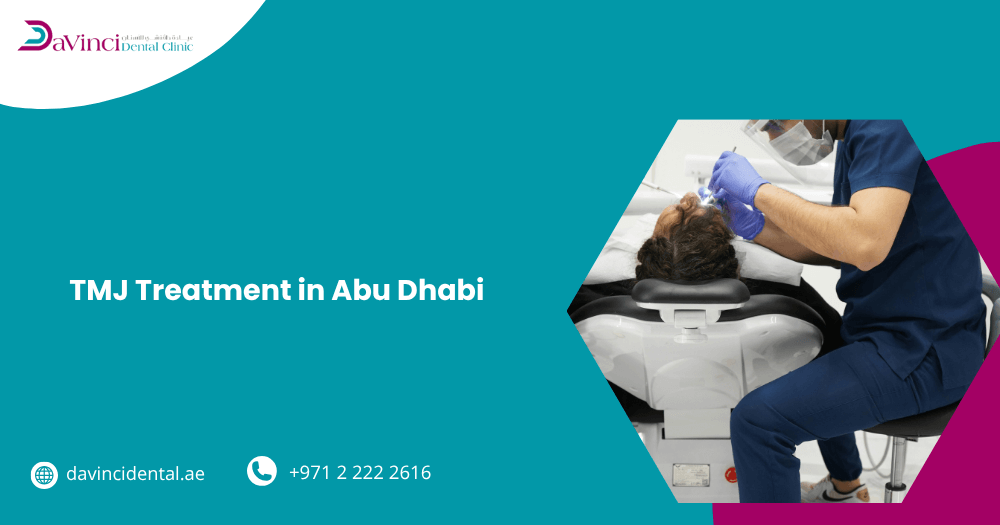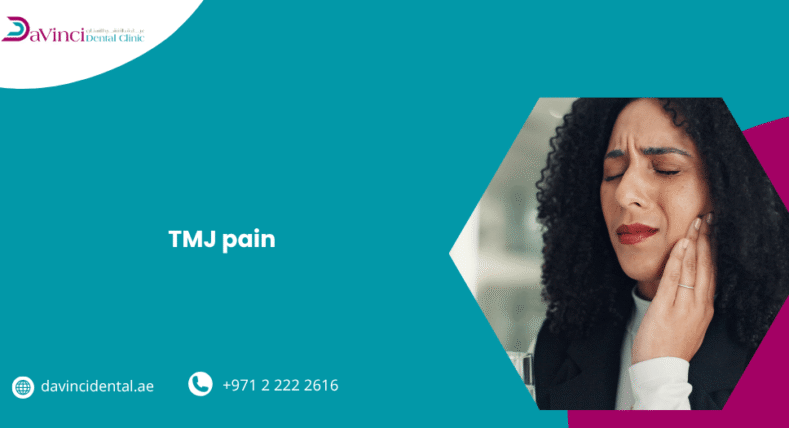A temporomandibular joint (TMJ) disorder may be the cause of your frequent headaches, clicking sounds while you chew, or persistent jaw pain.
The joint that connects your jaw to your skull is impacted by this common but frequently misdiagnosed condition, which can cause pain or discomfort during daily activities like speaking and eating.
Fortunately, there are several specialized options for TMJ treatment in Abu Dhabi, ranging from advanced surgical techniques to non-invasive treatments.
In this article, we’ll explore what TMJ is, its causes, how it’s diagnosed, and the types of treatments available to help you find relief and restore your comfort.
Table of Contents
What is TMJ?
TMJ disorders can often be successfully treated at home by changing posture or reducing stress. For the majority of TMJ, lifestyle modifications are necessary, maybe in addition to prescription drugs to reduce pain and suffering.
The joint that connects your jaw to your skull is called the temporomandibular joint (TMJ). The joint is located in front of your ears on both sides of your head. It enables you to speak and eat by allowing your jaw to open and close.
Additionally, a collection of disorders related to the jaw has been referred to by the acronym TMJ.
What Are The Symptoms Of TMJ Disorders?
The following are possible signs of TMJ disorders:
- Tenderness or pain in the jaw.
- One or both temporomandibular joints may be painful.
- Ache in and around the ear that hurts.
- Experiencing discomfort or difficulty during chewing.
- Face ache that hurts.
- Joint locking, which makes mouth opening and closing difficult.
- A headache.
- Discomfort in the neck.
- Eye discomfort.
- Jaw discomfort that coexists with toothache.
When you open your mouth or chew, TMJ issues may also produce a clicking sound or a grating feeling.
However, you probably won’t require therapy if your jaw clicking isn’t causing you any pain or limiting your range of motion.
Options For TMJ Treatment In Abu Dhabi
There are many options for TMJ treatment in Abu Dhabi at Davinci Dental Clinic. Here are a few examples:
Painkillers and anti-inflammatory medications
Ibuprofen and paracetamol are two examples of the medicines that can be used to treat TMJ issues. Your doctor will suggest more medications with higher dosages if these medications don’t resolve your issue.
Muscle relaxants
Patients receive muscle relaxants to help them relax their muscles and move their mouths without difficulty. These prevent obstacles by acting on the brain’s neuromuscular tissues. Another name for them is spasmolytics.
Physical therapy
Doctors will use various muscle-relieving activities to help patients relax.
People develop the precise mouth posture and practice jaw workouts that will maintain the teeth’s appropriate alignment. Exercises for treating TMJ disorders help many people realign their jaws.
Mouthguards
Since mouthguards stop teeth from clenching and grinding, they are used to treat TMJ problems. These protective measures make teeth more resilient to harm and enhance jaw mobility. Additionally, the mouthguards aid in the patient’s pain relief.
Surgical Treatment
When the TMJ condition worsens, doctors may find that surgery is the only option. This surgical procedure, known as arthroscopic surgical therapy, involves inserting an arthroscope into a tube that is placed between the joints. The following patients can benefit from the surgery:
- Locking of the TMJ.
- Excruciating jaw ache.
- Deformities.
- Dislocations.
- Psychological distress.
- Chronic eating disorders and chewing difficulties.
How Are TMJ Disorders Diagnosed?
Diagnosing TMJ disorders can be challenging. To diagnose your medical condition, a doctor could recommend that you see an ENT expert or a dentist.
The dentist may examine you to check for pain or swelling. Additionally, they could use a variety of imaging tests.
These may consist of:
- X-rays: Your dentist can view the position of your teeth and the bones in and around your jaw with these X-rays.
- CT scan: Compared to a standard X-ray, a CT scan of the jaw gives your doctor a more detailed examination of the bones and joint structures.
- MRI: If there are issues with the jaw’s structure, an MRI of the jaw will show it.
What Causes TMJ Disorders?
The cause of TMJ issues often remains unknown. Jaw or joint trauma might be a factor. Other medical conditions may also influence the development of TMJ disorders.
These consist of:
- Arthritis.
- Joint erosion (wearing away).
- Clenching or grinding of teeth.
- Birth defects in the jaw structure.
- Growth disorders
Risk factors
Although several variables are often linked to the start of TMJ problems, their cause has not been established.
Among them are:
- Hormones in women (estrogen is thought to be involved in the development of TMJ).
- Prolonged stress.
- Hypermobility of the joints.
- Bad posture that puts tension on the face and neck muscles.
Conclusion
Your ability to speak, eat, and even just get through the day pain-free can all be severely impacted by having a TMJ issue.
Fortunately, there are many options for TMJ treatment in Abu Dhabi, including advanced therapies, conservative home remedies, and surgical procedures. Long-term relief is possible with an early diagnosis and a customized treatment strategy.
Don’t hesitate if you’re having TMJ symptoms; speak with an Abu Dhabi healthcare provider to determine the best course of action and restore your comfort and standard of living.
Read More: TMJ Disorder In Abu Dhabi.
Frequently Asked Questions
What is the most successful treatment for TMJ?
TMJ has many successful treatments that depend on the case itself. Treatments may involve transcutaneous electrical nerve stimulation (TENS) and ultrasonography in addition to jaw muscle strengthening and stretching exercises. Additionally, stretching and moist heat work well when used often throughout the day.
Is TMJ 100% curable?
There could be a remedy if your TMJ pain is brought on by injury or long-term teeth clenching or grinding. It is dependent on the extent of the injury. As the jaw damage heals, the discomfort can eventually go away, especially if the injury is able to heal fully.
What is the best doctor to see for TMJ?
Since 1936, dentists have been the primary healthcare providers for TMJ. However, as we now know, TMJ is a complex condition that involves many biological systems, including the digestive, endocrine, immune, muscular, nervous, and skeletal systems. This is why it is necessary to include medical and other allied health professionals in patient care and research.




